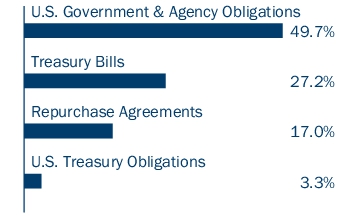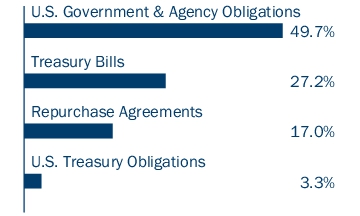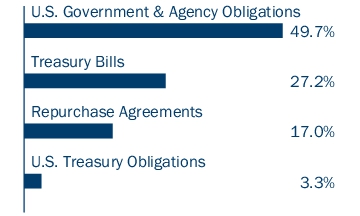Government money market fund risk
Although government money market funds (such as the Fund) may seek to preserve the value of shareholders’ investment at $1.00 per share, the net asset values of such money market fund shares can fall, and in infrequent cases in the past have fallen, below $1.00 per share, potentially causing shareholders who redeem their shares at such net asset values to lose money from their original investment.
At times of (i) significant redemption activity by shareholders, including, for example, when a single investor or a few large investors make a significant redemption of Fund shares, (ii) insufficient levels of cash in the Fund’s portfolio to satisfy redemption activity, and (iii) disruption in the normal operation of the markets in which the Fund buys and sells portfolio securities, the Fund could be forced to sell portfolio securities at unfavorable prices in order to generate sufficient cash to pay redeeming shareholders. Sales of portfolio securities at such times could result in losses to the Fund and cause the net asset value of Fund shares to fall below $1.00 per share. Additionally, in some cases, the default of a single portfolio security could cause the net asset value of Fund shares to fall below $1.00 per share. In addition, neither the Investment Manager nor any of its affiliates has a legal obligation to provide financial support to the Fund, and you should not expect that they or any person will provide financial support to the Fund at any time.
It is possible that, during periods of low prevailing interest rates or otherwise, the income from portfolio securities may be less than the amount needed to pay ongoing Fund operating expenses and may prevent payment of any dividends or distributions to Fund shareholders or cause the net asset value of Fund shares to fall below $1.00 per share. In such cases, the Fund may reduce or eliminate the payment of such dividends or distributions or seek to reduce certain of its operating expenses. There is no guarantee that such actions would enable the Fund to maintain a constant net asset value of $1.00 per share.
Interest rate risk is the risk of losses attributable to changes in interest rates. In general, if interest rates rise, the values of debt instruments tend to fall, and if interest rates fall, the values of debt instruments tend to rise. Actions by governments and central banking authorities can result in increases or decreases in interest rates. Higher periods of inflation could lead such authorities to raise interest rates. Increasing interest rates may negatively affect the value of debt securities held by the Fund, resulting in a negative impact on the Fund’s performance and net asset value per share. In general, the longer the maturity or duration of a debt security, the greater its sensitivity to changes in interest rates. The Fund is subject to the risk that the income generated by its investments may not keep pace with inflation.
The Fund may incur losses due to declines in the value of one or more securities in which it invests. These declines may be due to factors affecting a particular issuer, or the result of, among other things, political, regulatory, market, economic or social developments affecting the relevant market(s) more generally. In addition, turbulence in financial markets and reduced liquidity in equity, credit and/or fixed income markets may negatively affect many issuers, which could adversely affect the Fund’s ability to price or value hard-to-value assets in thinly traded and closed markets and could cause significant redemptions and operational challenges. Global economies and financial markets are increasingly interconnected, and conditions and events in one country, region or financial market may adversely impact issuers in a different country, region or financial market. These risks may be magnified if certain events or developments adversely interrupt the global supply chain; in these and other circumstances, such risks might affect companies worldwide. As a result, local, regional or global events such as terrorism, war, other conflicts, natural disasters, disease/virus outbreaks and epidemics or other public health issues, recessions, depressions or other events – or the potential for such events – could have a significant negative impact on global economic and market conditions.
Shareholder concentration risk
At June 30, 2024, affiliated shareholders of record owned 91.6% of the outstanding shares of the Fund in one or more accounts. Fund shares sold to or redeemed by concentrated accounts may have a significant effect on the operations of the Fund. In the case of a large redemption, the Fund may be forced to sell investments at inopportune times, including its liquid






